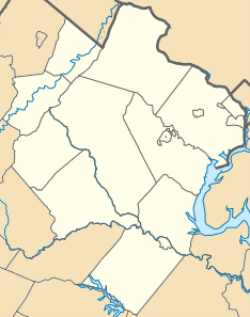The topic of this article may not meet Wikipedia's notability guideline for geographic features .(May 2024) |
Accotink, Virginia | |
|---|---|
 Houses along Backlick Road in Accotink | |
| Coordinates: 38°42′30″N77°9′34″W / 38.70833°N 77.15944°W | |
| Country | |
| State | |
| County | Fairfax |
| Time zone | UTC−5 (Eastern (EST)) |
| • Summer (DST) | UTC−4 (EDT) |
| GNIS feature ID | 1494807 [1] |
Accotink is an unincorporated community in Fairfax County, Virginia, United States. Accotink is located along Accotink Creek within Fort Belvoir.
Accotink Bay, Accotink Bay Wildlife Refuge, and Lake Accotink are also in the area.
The Magnus Temple of the Ancient Egyptian Arabic Order of the Nobles of the Mystic Shrine is in Accotink.



